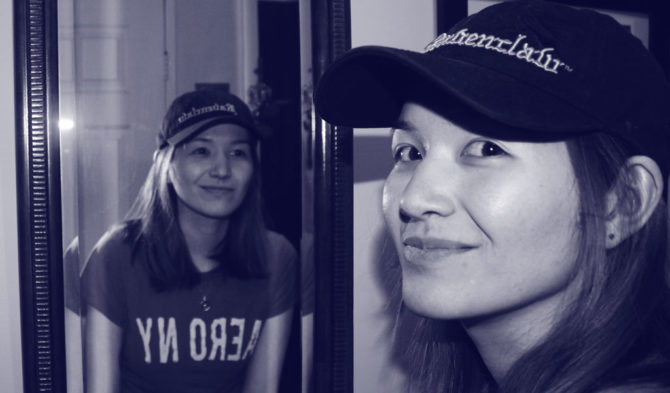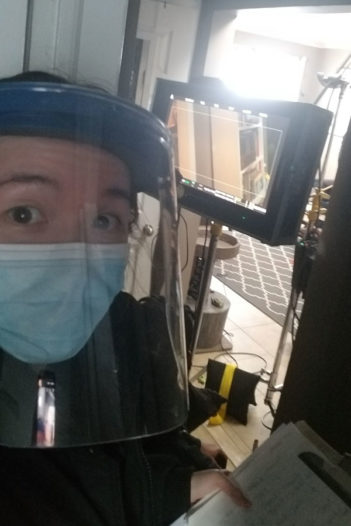From FanFic to Movie Scripts | Melissa Zbozny’s Screenwriting Story
From pursuing science studies in university, to dabbling in sci-fi fan fiction, to enrolling at Toronto Film School – Melissa Zbozny’s path to discovering her passion for screenwriting wasn’t always a straightforward one.
Growing up, the Toronto-born, Mississauga-raised 31 year old always thought she was destined for a career in science. Soon after beginning her post-secondary studies with a double-major in Genetics and Cell Biology, however, Zbozny discovered fan fiction. This creative writing outlet allowed her to continue the storylines of her favourite shows, even long after they went off the air.
“Partway through my time at the University of Toronto, my focus moved from the sciences to television and storytelling, thanks to my discovery of fan fiction,” said Zbozny, who got her start writing about sci-fi series including Dark Angel and Supernatural.
Her passion for screenwriting ignited, Zbozny added film studies to her slate of university courses, and, after graduating with her degree, decided to enroll at Toronto Film School.
One feature film script and two T.V. pilots later, Zbozny is now set to graduate as the Class of 2021’s Writing for Film & Television program valedictorian.

She recently sat down to reflect on her time at Toronto Film School, her passion for screenwriting, and her plans for the future. Here’s what she had to say:
Please tell us a little bit about yourself.
I was born in Toronto, raised in Mississauga, then returned to Toronto for my post-secondary education at the University of Toronto. I went to UofT for a double science major (Genetics and Cell Biology). But after three years of not really enjoying that route, I switched my Cell Biology major into two minors that were based on what my interests were at the time – Film Studies and Classical Civilization Studies). Classical Civilization Studies may seem odd, but I did it to learn more about ancient mythologies. With these new courses, I also took a writing course that had me interested in becoming an author (since being a screenwriter seemed too impossible to achieve at that time).
I’m passionate about television – specifically character arcs and the storylines of fantasy/sci-fi/dystopian genres being brought to life. In the early 2000s, I was starting to watch more television and keeping up with multi-episode storylines. In 2004, I reconnected with the T.V. show Dark Angel after it was cancelled, yet I was now at the age where I could watch it. I was intrigued by this post-apocalypse world, and I wanted to learn more. As I was searching for more, Supernatural started in 2005 and I was immediately hooked (and I remained hooked even after the series ended in 2020 after 15 seasons). I was opening my interests into more dark genres with fantasy/sci-fi elements and really looking into potential mythologies that were always out there, but I feared them as a child. Then I stumbled upon crossover fanfictions of Dark Angel and Supernaturaltogether and that just opened my mind further at the possibility of reading and later writing my own stories to continue the journey for my favourite characters from my favourite shows. That discovery led me to re-evaluate a lot of the other shows I would later watch and rewatch. When I would read fanfiction stories, I always deemed them to be excellent for me if the story allowed for me to truly envision the television characters into these new scenarios, which made me realize that I was more of a visual viewer than a descriptive one. This had me rethinking the screenwriter idea.
What brought you to Toronto Film School? Where were you in life when you decided to continue your studies with us?
After graduating from UofT in 2014, I found myself not wanting to find a job in the scientific field – which was ironic, since that is what my degree was for. I wanted something in film, yet I knew I didn’t have enough experience for it to be taken seriously. That left me with writing. I started writing for AsianWave Magazine for some featured articles and some film reviews during TIFF. While working for the magazine, I became an intern at Cedarvale Pictures Inc. as one of their script readers. That was an interesting experience as I had to teach myself the film structure as I gave constructive feedback. In between those, I tried to write my own novel, but I always got stuck at the planning stages while I worked in retail.
I found a stable retail job that I was content to work at while I wrote in my spare time. Eventually, all my coworkers were moving on to the jobs they studied for, and I started feeling like I was trapped. When I re-evaluated what I wanted to do with my life, my answer was to write stories and have people connect with them. Since I’m more visual than literary, that led me back to becoming a screenwriter. When finding potential film school options, Toronto Film School had all the answers I needed and the structure that I needed to bring my concepts to fruition. Ideas that were taking me five to six years to develop now had more completed for it than ever before since I used them as my portfolio pieces at TFS. Thanks to TFS, I finally found momentum with my ideas.
What made you decide to pursue your passion for screenwriting?
I finally asked myself the question, ‘Why am I waiting? What is stopping me from doing this?’ I wasn’t keeping myself accountable for my personal projects and that meant going years before anything new was added to it. Once I realized what the program structure was like at TFS, I immediately realized that it was the structure I needed to help me move forward and keep myself accountable for my own deadlines. It was the learning structure that I needed, and it pushed me into the momentum that I graduated with.
What is the most important thing you’re taking away from your studies at TFS?
The most important thing I’ve taken away from my experience at TFS is to make the most of every opportunity at the school if you are physically able to. I didn’t think of it as school, but more like I was on a work probation and that I needed to make a good impression. That was a lot of pressure on me, I do realize that, but I’ve found that it has helped me to establish this work ethic for myself and to my peers. I wish I knew that from the start, then I could’ve taken more advantage of what the program had to offer during the earlier terms of my program instead of near the tail end of it.
Because most of my program was spent online due to the pandemic, I also realized how invaluable the relationships I formed with my classmates were. It was odd not seeing them in person, yet we took advantage of the video calls and how we could collaborate more often and for longer because of this, instead of worrying about each other’s commuting schedules. I always missed out on events because of my travel time so for us to meet online for hours at a time, helped me build bonds and connections with people that I’m still speaking to six months after we’ve graduated, and I plan to have them in my corner in the future.

What are your plans after graduation, both immediate and long-term?
I am currently in pre-production for my short film that is filming in mid-November. As the writer, I’ve been working on it for the last four months, and now I’m tackling it as a co-director. It’s a challenge to take on the co-director role. Still, I figured if this is the only project where I get to be fully involved with the creative control from start to finish, then I might as well use it to my advantage to see if I do want to be a director down the line, or if I should leave that job to someone else.
My long-term plan is to become a showrunner of my show. Until then, I hope to get onto sets, get into writing rooms, and pitch my concepts to production companies. I had a great experience pitching to Andrew Barnsley of Project 10 about my robot comedy (Jade and A.N.D.I.), and I got great feedback and interest in the project. I hope to explore that avenue a little more in the future.
If you offered one piece of advice to an incoming student, what would that be?
My advice would be to connect with your classmates. Offer your feedback kindly, show support, be the ‘how can I help?’ person. Once you graduate, your classmates will become your future colleagues, and the same goes for your instructors. Just leave everyone with a good impression of you because this industry is small (something I’m realizing more with each project I’m on), and referring people to others seems to be the chosen route for hiring people.


